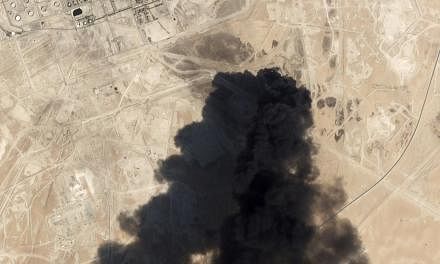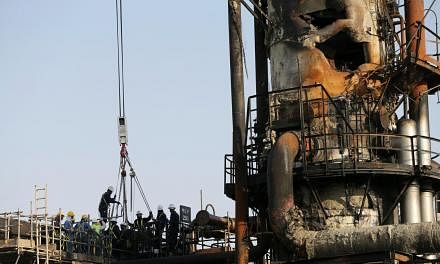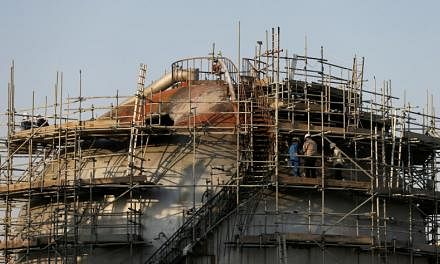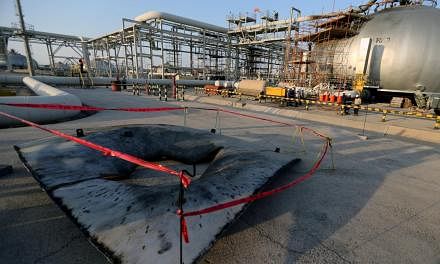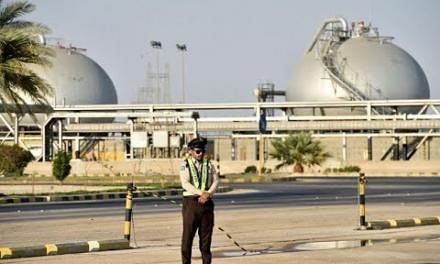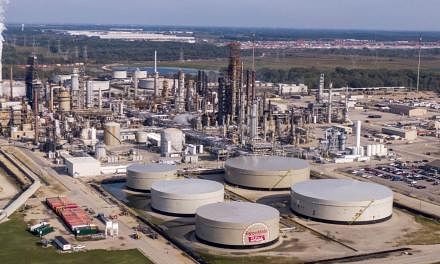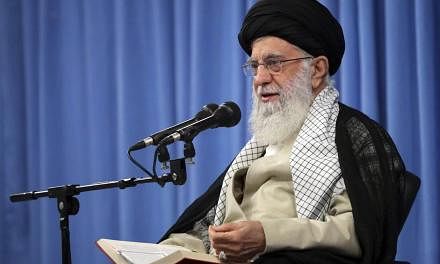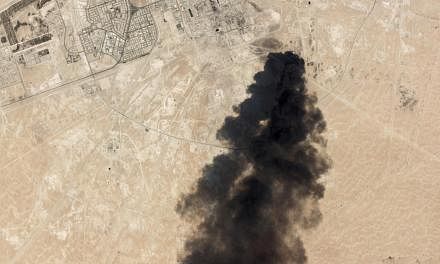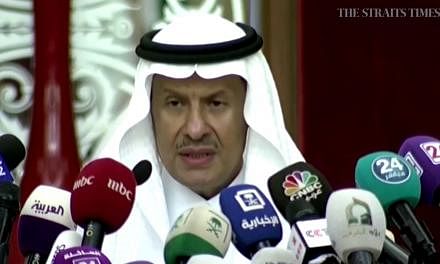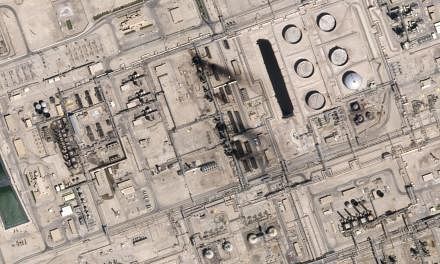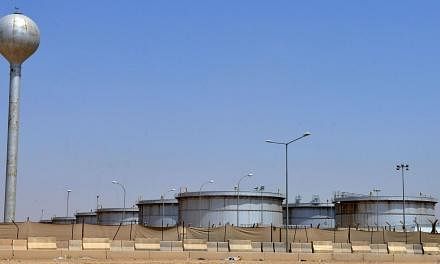SEOUL/BANGKOK/TOKYO (BLOOMBERG, REUTERS) - The massive drone strike on the world's largest crude-processing facility operated by Saudi Arabia's Aramco has global ramifications, particularly for economies in Asia.
The region consumes more oil than anywhere else, with China, India, Japan and South Korea among the world's top buyers.
The strike on the Saudi Arabian Oil Co facility, which the US blamed on Iran, knocked out roughly 5 per cent of the global supply.
Oil prices surged the most on record on Monday, with Brent crude seeing its biggest gain in dollar terms since futures started trading in 1988.
Here's how Asian governments are reacting so far.
SOUTH KOREA
South Korea said on Monday (Sept 16) that it would consider releasing oil from its strategic oil reserves if circumstances around crude oil imports worsen in the wake of last Saturday's attack on Saudi Arabia's oil facilities.
The energy ministry said in a statement that it anticipated no short-term impact on securing crude oil supplies from Saudi Arabia. But if the situation drags on, it might disrupt crude oil supplies, the ministry added.
South Korea, the world's fifth-largest crude oil importer, currently has about 96 million barrels of crude oil and refined products as strategic stockpiles. Of the total 96 million barrels, the country holds 82 million barrels of crude oil and the rest are refined products such as gasoline, diesel and naphtha.
"The government will do its best to stabilise the demand and supply situation and prices, such as considering release of oil reserves if the situation worsens," the ministry said. The stockpiles cover about 90 days of South Korea's oil requirement.
The country's oil refiners also weighed in: GS Caltex Corp will keep a close eye on market conditions and prepare countermeasures to ensure that supply and demand aren't affected.
There is no disruption to S-Oil Corp's crude procurement in the short term, but at this point it is hard to know whether there'll be an impact on supply going forward, it said.
Hyundai Oilbank Co's short-term crude flows have not been impacted, while SK Innovation Co said it may have to monitor the impact on supply longer than initially anticipated, given the price reaction.
JAPAN
"Stable oil supply from the Middle East region is indispensable for the stability and prosperity of the global economy including Japan," the Japanese foreign ministry said in a Sunday night statement. The government "strongly denounces such terror attacks", it said.
Japan remains committed to "continuously engaging" with the region in cooperation with other countries to maintain and reinforce peace and stability in the Middle East, it said.
There was no immediate public comment from the Ministry of Economy, Trade and Industry in Tokyo, which handles energy.
CHINA
The country's National Energy Administration didn't immediately reply to a fax seeking comment on Monday morning. China National Petroleum Corp, the nation's biggest oil and gas company, declined to comment on Monday, while refining giant Sinopec did not respond to requests for comment.
INDIA
Mr Raveesh Kumar, India's foreign ministry spokesman, declined to comment.
India imports about 75 per cent of its oil requirement. Of this, as much as 40 per cent comes from Saudi Arabia.
The spike in oil prices because of the attacks comes when growth is slowing. The economy expanded 5 per cent in the three months through June from a year earlier, the slowest pace since March 2013.
TAIWAN
Mr Yu Cheng-wei, director general of Taiwan's Energy Bureau, said on Monday that it was closely monitoring whether there would be a longer-term impact.
"Short-term impact to Taiwan is limited, as our oil import from Saudi Arabia is not much and Taiwan's oil storage days are over 140 days, much higher than regulated level of 90 days," he said by phone.
"We are diversified in terms of source of oil imports, and this incident looks like a individual case."
AUSTRALIA
"I am not in the business of forecasting oil prices but we have to make sure we do everything in our power to make sure there is no threat to Australia's fuel supply," Australian Energy Minister Angus Taylor told reporters in Canberra on Monday.
"We are told by the IEA (International Energy Agency) that there is no immediate threat to Australia's fuel supplies and there are ample global supplies."
THAILAND
Thailand said it did not expect its oil imports to be disrupted. Its officials have contacted Aramco and were told the situation was under control and an impact assessment underway, Energy Minister Sontirat Sontijirawong said in a statement on Sunday.
Oil accounts for more than 10 per cent of the basket of goods used for Thailand's consumer-price index, making it key for the country's inflation outlook.
Supplies to state-controlled PTT Pcl won't be impacted, and the energy ministry has a contingency plan in place to satisfy oil demand in its economy, the statement said.
PHILIPPINES
Philippine Central Bank Governor Benjamin Diokno said the South-east Asian nation's monetary authority was monitoring financial markets' reaction to the Aramco attack.
When asked if the incident would be a main factor at the country's Sept 26 rate meeting, he said he expected the attack and its potential consequences would form part of the brief.
Mr Diokno said last Friday that the next Philippine rate cut could come this month.
The Philippines has a provision in its law that allows a reduction in oil tax if prices rise above a certain level, and this is something the government can choose to invoke, Mr Diokno said on Monday morning.
He added that countries including the US could fill the oil supply shortage by tapping reserves, and that there could be a spike in speculative demand.
INDONESIA
Indonesia imports 110,000 barrels of oil per day from Aramco, and the government hopes the Saudi oil giant is able to meet that commitment from its other facilities, said Mr Djoko Siswanto, acting director general for oil and gas at the country's energy ministry.
State-run oil refiner PT Pertamina is working with Aramco regarding the supply of Arabian Light crude used in Pertamina's Cilacap refinery, according to spokesman Fajriyah Usman.
There is no change in the schedule and volume of crude oil committed by Aramco for Pertamina so far for Cilacap's Unit IV, she said by text on Monday.
"The supply of fuel stocks that originated from Aramco's crude is still at a secure level to fulfil domestic demand," she said.

